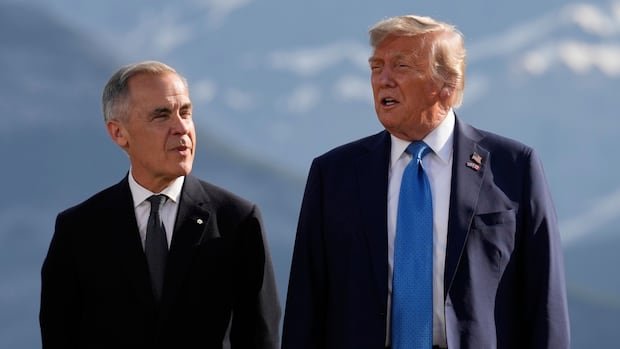As Mark Carney travels to Washington, there is mounting pressure on the prime minister to finalize a trade agreement. Simultaneously, the Trump administration faces increasing demands from various sectors. American farmers seek financial aid, bourbon producers advocate for tariff alleviation, and automakers request relief from their own trade burdens.
Recent surveys indicate a growing proportion of the American population believes the economy is headed in the wrong direction. Recognizing that the costs of the ongoing trade dispute will escalate, some experts advise President Trump to reach a resolution promptly.
Chris Sands, from the Center for Canadian Studies at Johns Hopkins University, suggests that a truce on the United States-Mexico-Canada Agreement (USMCA) before the November 2026 midterms would be politically advantageous. Such an agreement could help end the trade conflict with the major U.S. trade partners, stabilize prices, and foster a conducive environment for business investments.
Despite this, Sands doubts whether Republicans are prepared for such a move, leaving industries most affected by tariffs to advocate for further assistance. The automotive sector, heavily impacted by part tariffs, is at the forefront of this effort.
Ford’s recent financial reports reveal they anticipate paying $2 billion in tariff-related expenses through the first half of the year. Ford CEO Jim Farley expressed frustration, emphasizing the hindrance these costs pose to further investments in the U.S.
Following this, a Trump ally promised significant tariff relief for automakers, particularly those with final assembly operations in the U.S. Senator Bernie Moreno specified that major automotive manufacturers, including Ford, Toyota, Honda, Tesla, and GM, would be exempt from tariffs.
The specifics of this relief, including potential exemptions for Canadian auto parts or steel, remain ambiguous. There are expectations of partial relief from steel tariffs for Canada’s delegation, as reported by CBC News.
Meanwhile, the financial burden of bailouts for sectors impacted by the trade conflict is escalating rapidly. American soybean farmers have been adversely affected by China’s retaliatory measures, locking them out of the profitable Chinese market.
President Trump announced on Truth Social that tariff revenue would support soybean farmers, with Treasury Secretary Scott Bessent later confirming forthcoming relief for these farmers.
Estimations suggest the relief package could range from $10 billion to as high as $50 billion, attracting significant lobbying efforts. The surge in lobbying activities related to tariffs and trade issues has reached record levels in 2025, with over $900 million spent on advocacy.
This surge in lobbying has drawn criticism from traditional conservative allies, including the Wall Street Journal’s editorial board. They highlighted how tariffs contribute to expanding lobbying activities in Washington, known as ‘the swamp.’
Trade experts warn of impending challenges as the trade war persists, with increasing costs likely to be passed on to consumers. Businesses have hesitated to raise prices thus far, but there is a consensus that cost increases will eventually be inevitable.
With pressure mounting on Mark Carney to secure a deal, the necessity for trade peace in the U.S. becomes apparent amidst rising costs and substantial bailouts. However, experts caution that convincing arguments alone may not suffice in the current political climate.
Clark Packard from the Cato Institute notes signs of economic strain in the U.S. due to tariffs and anticipates discussions on various trade-related issues at the upcoming meeting between both leaders.

